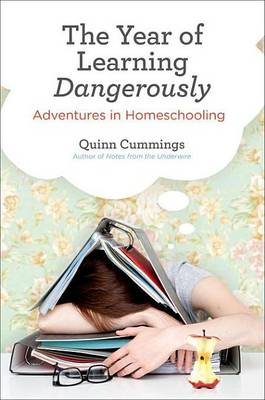Reviewed by lovelybookshelf on
In The Year of Learning Dangerously, Quinn Cummings chronicles her family's decision to take her daughter out of public school and homeschool for a year. It starts off great. Cummings addresses her reasons for choosing to homeschool, as well as some of the concerns parents (and other people) have. I especially appreciated her comebacks to the tired "what about socialization?" questions and comments.
There are plenty of witty moments, ones all of us who homeschool can relate to. But shortly after the opening few chapters, I started to have mixed feelings about the book.
What bothered me is this: While exploring some of the different homeschooling styles, she seemed to purposefully seek out minority fringe groups rather than looking into what typical homeschoolers do. For example, the entire unschooling chapter was about radical unschoolers… at a convention, no less. Why cover radical unschooling but not unschooling, which is far more common?
She also had a tendency to gloss or even skip over points in order to be clever and funny. Her overview of classical education was more of a caricature than reality. She couldn't finish reading The Well Trained Mind to see the big picture? Okay, fair enough; it is a massive text. But why not visit the Well-Trained Mind message forum instead? Or seek out local classical homeschoolers and ask what they do on a normal day?
It seemed as if she was looking for the most outrageous examples of homeschooling approaches. What was the overall point of doing so? Shock value? It certainly doesn't seem like she bothered trying for a fair representation of typical homeschoolers. (And the group I'm in is a very eclectic bunch - we have members who are unschoolers, religious, secular, Charlotte Mason, classical, Montessori, child-led, relaxed, and everything in between.)
The Year of Learning Dangerously did even out toward the end. The prom and graduation chapters were very sweet, and I hope that my daughter ends up feeling the way those graduates did about their education. I'm glad Cummings mentioned that plenty of us homeschool not for extreme religious reasons or out of fear of the government or society. I liked her optimism in the final chapters, and I'm glad she found a style that works for her family.
I would have enjoyed this far more if, for the majority of the book, Cummings had spent less time poking fun at extremist fringe groups and more time observing typical examples of various homeschooling styles. I think she would have gotten a lot more out of the experience, and it would have made for a more timeless, useful book. The fact that this is a memoir, her experience, is probably what saved the read for me.
Reading updates
- Started reading
- 10 January, 2014: Finished reading
- 10 January, 2014: Reviewed
